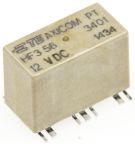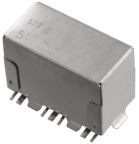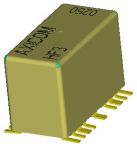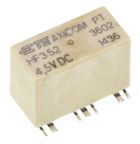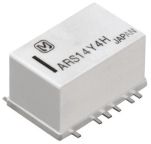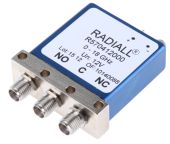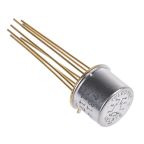- Automation & Control Gear
- Cables & Wires
- Enclosures & Server Racks
- Fuses & Circuit Breakers
- HVAC, Fans & Thermal Management
- Lighting
- Relays & Signal Conditioning
- Switches
- Batteries & Chargers
- Connectors
- Displays & Optoelectronics
- ESD Control, Cleanroom & PCB Prototyping
- Passive Components
- Power Supplies & Transformers
- Raspberry Pi, Arduino, ROCK, STEM Education & Development Tools
- Semiconductors
HF & RF Relays
HF (high frequency) and RF (radio frequency) relays utilise radio signals to perform switching functions. These relays are found in a variety of applications, including computers, testing equipment, and radio broadcast systems. They're needed to handle the high voltages that often come with high frequencies, which standard relays cannot manage.
The frequencies used in electronic devices are continually increasing and high-frequency relays provide a way to isolate circuits in a high-frequency environment. High-frequency relays can be used in any application where an electronic signal is being produced at a very high frequency. This includes communications equipment, as well as computers and industrial machinery.
RF relays are specifically used in radio applications, often found in testing equipment as well as radio broadcasting devices. RF relays are essential in activating the separate circuit systems in radios that are used for transmitting and receiving signals.
Difference Between HF & RF Relays and Standard Relays
HF and RF relays are designed for high-frequency applications where signal integrity is crucial, unlike standard relays. They minimise signal distortion and loss through specialised contact materials and shielding. Key differences include:
- Frequency Handling: HF/RF relays handle high frequencies (typically in the MHz/GHz range), while standard relays are generally designed for lower frequencies (kHz range).
- Contact Design: HF/RF relays use specialised contacts to minimise signal degradation.
- Insulation and Shielding: HF/RF relays often feature enhanced shielding to prevent electromagnetic interference (EMI).
This makes HF/RF relays ideal for applications like telecommunications and test equipment where standard relays would be unsuitable.
Types of HF and RF Relays
High-frequency and RF relays can be built with special features. For instance, they can be made flux resistant, immersion cleanable, wash tight or designed for low power consumption. Solid-state versions of these relays are also available. Some common types of HF and RF relays include:
Electromechanical RF Relays
Electromechanical RF relays use physical contacts to switch signals, providing high isolation and low insertion loss. They are ideal for applications such as communication systems and test equipment.
Solid-State RF Relays
Without moving parts, solid-state RF relays offer increased reliability, faster switching speeds, and longer operational lifespans compared to traditional electromechanical relays.
Coaxial RF Relays
Designed for managing coaxial cable connections, these relays minimise signal degradation while providing superior shielding. They are commonly used in systems like broadcast and satellite applications.
High-Power RF Relays
Built to handle high power levels, these relays are used in applications such as radar systems and industrial RF heating processes.
Latching RF Relays
These relays maintain their position even after power is removed, reducing energy consumption and thermal load. They are particularly useful where continuous signal path maintenance is required without a constant power supply.
Miniature RF Relays
Compact in size, these relays are perfect for applications with space constraints, such as portable communication devices or medical equipment.
Key Features of HF and RF Relays
HF and RF relays possess distinct features that set them apart from standard relays and make them suitable for high-frequency applications.
Flux Resistance
Many HF and RF relays are designed with flux resistance, meaning they can withstand exposure to soldering flux during manufacturing processes. This prevents contamination and ensures reliable operation even after being subjected to flux cleaning.
Immersion Cleanable Design
Some HF and RF relays are immersion cleanable, allowing them to be submerged in cleaning solvents without damage. This is crucial for applications requiring thorough cleaning and sterilisation, such as medical devices and aerospace systems.
Low Power Consumption
Certain HF and RF relays are designed for low power consumption, making them ideal for battery-powered devices or applications where energy efficiency is essential.
Wash Tight Features
Wash-tight relays are sealed to prevent the ingress of liquids and contaminants during cleaning processes. This ensures reliable performance even after exposure to harsh washing or cleaning procedures.
Isolation and Frequency Handling
HF and RF relays provide excellent isolation between the control circuit and the signal path, preventing interference and ensuring signal integrity. They are specifically designed to handle high-frequency signals.
This makes them suitable for applications like telecommunications, radar systems, and test equipment where high-frequency signals are prevalent.
Industrial Applications of HF & RF Relays
Discrete Manufacturing
In discrete manufacturing, HF and RF relays are used in:
- Automated Test Equipment: These relays facilitate high-speed signal switching and routing in automated testing systems.
- Wireless Communication Systems: They enable seamless switching between different communication channels in wireless devices and systems used in manufacturing environments.
- Robotics and Automation: HF and RF relays control high-frequency signals in robotic systems and automated production lines.
Process Manufacturing
In process manufacturing, HF and RF relays find applications in:
- Industrial Heating Systems: They control high-frequency power supplies used for industrial heating processes.
- Medical Equipment: HF and RF relays are used in medical imaging systems and therapeutic devices that utilise high-frequency signals for diagnosis and treatment.
- Chemical Analysis: They enable precise control of high-frequency signals in analytical instruments used for chemical analysis and quality control.
Energy & Utilities
In the energy and utilities sector, HF and RF relays are essential for:
- Smart Grid Infrastructure: They enable reliable switching and routing of high-frequency communication signals in smart grids.
- Renewable Energy Systems: HF and RF relays are used in solar power inverters and wind turbine control systems, ensuring efficient energy conversion and grid integration.
- Power Line Communication: They facilitate high-frequency communication over power lines, enabling remote monitoring and control of infrastructure.
Facilities & Intralogistics
In facilities and intralogistics, HF and RF relays are used in:
- Wireless Tracking Systems: They enable reliable communication and data transfer in wireless tracking systems used for inventory management and asset tracking.
- RFID Systems: HF and RF relays control the high-frequency signals used in RFID readers and tags.
- Automated Storage and Retrieval Systems (AS/RS): They ensure precise and reliable control of high-frequency signals in AS/RS.
How to Select the Suitable HF & RF Relays
Voltage and Current Capacity
Choose a relay with voltage and current ratings that exceed the maximum values expected in your application. This ensures the relay can handle the electrical load without damage or performance degradation.
Frequency Range
Select a relay with a frequency range that encompasses your operating frequency to ensure effective handling of high-frequency signals without excessive loss or distortion. If you anticipate future higher frequencies, choose a relay with a broader frequency range.
Environmental Conditions
Consider environmental factors such as temperature range; select a relay that can operate within expected temperatures. For more humid and moisture-prone environments, choose one with moisture protection features. For applications involving vibration or shock, opt for a relay designed to endure those conditions.
Durability and Lifespan
Evaluate the relay's lifespan against your requirements to ensure reliable long-term operation. Look for durable construction using quality materials from reputable manufacturers known for reliability.
Trusted HF & RF Relays Manufacturer, Supplier & Distributor in Malaysia
RS is a leading distributor of high-quality HF & RF relays in Malaysia, offering a comprehensive range to suit diverse voltage requirements. We understand the importance of precise voltage matching, and our inventory includes popular options like 5V coil voltage HF & RF relays, ensuring you find the perfect fit.
We source our HF and RF relays from trusted manufacturers like TE Connectivity, Teledyne, Panasonic, and Omron. Our comprehensive range of HF and RF relays caters to diverse needs and budgets. We offer cost-effective solutions starting from around RM 400 for general-purpose applications, while high-performance, specialised relays for critical applications can range up to RM 19,000.
Buy Frequency Relays Online from RS
Discover a comprehensive selection of high-quality HF and RF relays, solid state relays, and safety relays from our online catalogue. Browse through our easily navigable website to find the perfect industry-leading equipment for your next project. For detailed information about our delivery options and estimated delivery times, please visit our delivery information page.
Related links
- RF Switches
- Panasonic Surface Mount High Frequency RF Relay 1GHz Max. Coil Freq., DPDT
- Panasonic PCB Mount High Frequency RF Relay 3GHz Max. Coil Freq., SPDT
- Multilayer Organic Capacitors
- RF Detectors
- Omron PCB Mount High Frequency Relay DPDT
- Omron PCB Mount High Frequency Relay 50Ω Impedance DPDT
- Omron Surface Mount High Frequency Relay DPDT
